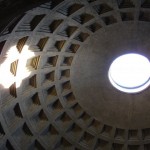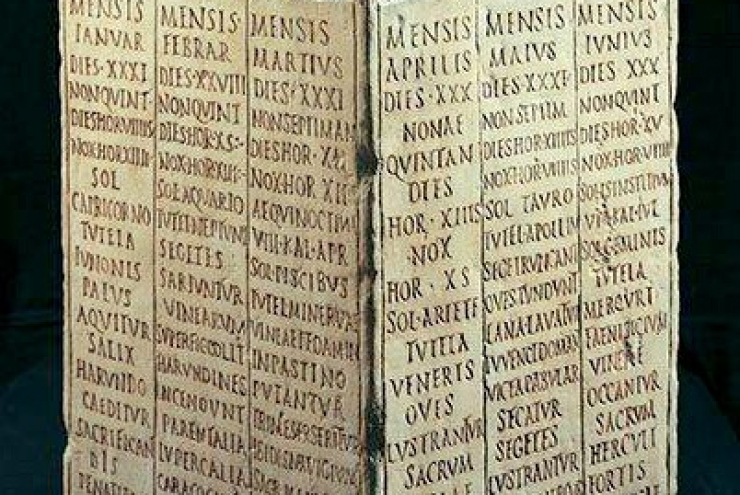Plotinus: the foundation of Neoplatonism.
 By the middle of the third century, the times were ripe for the foundation of Neoplatonism. Plotinus had certainly captured the legacy of his master Ammonius Sacca, who, like Socrates, had left nothing written, but probably had positions very close to Plotinus’ Neoplatonism. Numerous writings of Numenius of Apamea were also circulating, which Plotinus used to quote. Initially Plotinus, following the example of Ammon, had written nothing, but his disciple Porphyry, who had a great mind, systematically re-ordered the notes of the lessons held in Rome by the master, recompiling them neatly, writing the Enneads (Ἐννεάδες), a work organized in six volumes of nine treatises each.
By the middle of the third century, the times were ripe for the foundation of Neoplatonism. Plotinus had certainly captured the legacy of his master Ammonius Sacca, who, like Socrates, had left nothing written, but probably had positions very close to Plotinus’ Neoplatonism. Numerous writings of Numenius of Apamea were also circulating, which Plotinus used to quote. Initially Plotinus, following the example of Ammon, had written nothing, but his disciple Porphyry, who had a great mind, systematically re-ordered the notes of the lessons held in Rome by the master, recompiling them neatly, writing the Enneads (Ἐννεάδες), a work organized in six volumes of nine treatises each.
We do not exaggerate by saying that Plotinus is one of the highest minds not only of ancient thought but also of the philosophy of all time. He is the founder of a complete and sound doctrine, which not only does not rely on any religion, characteristic that any good philosophy should meet, but which also provides a valid logical support to both polytheism and monotheism, to such an extent as to be defined a philosophy of religions, transcending the interreligious differences. Nobody else but Plotinus in history has been able to formulate such a definite doctrine. In the field of polytheism, all those who followed took full control of his cosmological vision and structure, integrating it with the religion of the Gods and with the popular magic practices, creating a wonderful philosophical work with ample spectrum.
Here we briefly look at the basic principles of Plotinus’ metaphysics, which are the pillars of Neoplatonism and which will be the basis for discussions on the next authors.
From the times of Parmenides, the problem had been to relate a perfect Being, superior to everything, immobile and eternal, with a chaotic world in perpetual temporal evolution. The excellent minds of the past had until then found two coherent solutions, leading to extreme consequences the logical thought to one way or to the opposite:
- Only the Being is true, while becoming is illusory. This is the line followed by Parmenides, and partly by Plato, for example in the myth of the cave. At this extremity are the philosophies that place the emphasis on mind and thought. Buddhism itself states that everything is Mind, while matter and becoming are illusions.
- Only becoming is real while there is no place for metaphysics. This is the approach of Hellenistic philosophies, mainly related to materialism, such as Epicureanism and Stoicism, as well as the many versions of modern materialism.
We define these two positions as coherent because they are supported by a clear and crystalline logic. A third path, conciliatory and all-encompassing of matter and being, was undertaken by Aristotle. Certainly, Aristotle, the founder of logic, had not presented an “illogical” model, yet in the face of the simplicity of the first and the second solution, complicated the description of reality by introducing categories and various distinctions, such as the definition of essence, which could range from ideas to matter, passing through the “synolon”. Actually, the great Aristotelian construction could not resolve the problem of the relationship between the Perfect Being (Unmoved Mover) and the becoming over time, even though it anticipated a great conception that would then be resumed by the Neoplatonism.
Plotinus has been the first to present a perfectly logical and crystalline philosophical system, covering both matter and being. The Being, which coincides with the Intellect, has to contain a multiplicity within it, represented by ideas, as otherwise, the whole derived cosmos would remain frozen without any degree of freedom. On the other hand, the first cause cannot contain multiplicity within it, because if a different case the causal chain would diverge to infinity instead of converging. This reasoning prompted Plotinus to support the existence of a single “super-essential” and “super-intellectual” principle, a principle transcendent of Being and at the same time its foundation or essence, or, in other words, hypostasis. This principle is the One, unity and absolute simplicity without any multiplicity. It is infinite, with an endless power of generation. It is eternal because otherwise it would be subject to becoming and would not be the first cause. It is singular and without multiplicity, because otherwise, it would not be a definite cause. He does not need anything, he is self-sufficient and has no external cause, but is caused by itself, causa sui. It is what it wants to be. It is the first hypostasis of Plotinus, the principle of all things, present in all but possessed by nothing. The mathematical accumulation point of all reality.
The introduction of the One as an over-essential and supra-intellectual entity is the first of the three fundamental steps of Plotinus’ philosophy, which, if it were limited to the first step, would not go far beyond the achievements of Parmenides, falling again victim to the immobility of perfection. The second step arises from the following question: why would something so perfect generate anything other than itself? Here comes the second step of Plotinus’ philosophy: beside the hypostases, he hypothesizes an energy flowing from the One through the whole chain of progression. The entire formation of the universe is related to the propagation of this energy. In detail, according to Plotinus, every hypostasis has an “internal” activity (in Greek: “energeia”) that makes it what it is. This internal activity is accompanied by an “external” activity, which derives from the first and which follows the first in all respects, but which differs from the original subject. This activity is not yet organized in anything and is similar to the shapeless matter of the perceptible world, with the difference that it is eternal and subtle. This sort of transcendent matter is defined as intelligible matter. The third step is to understand how intelligible matter can give rise to the formation of another hypostasis beyond the One, thus transmitting not only energy and chaotic propagation but also the cosmic order. External activity, when it turns toward its source, realizes to be split into subject-object and becomes a new entity, the Intellect or Nous. These are therefore the ingredients of the formation of the metaphysical hierarchy: internal and external activity (energeia), progression (prohodos) and conversion (epistrophé). In other words the One, in the One, is the pure subject that self-realizes (internal activity). As the One sees itself, the subject-object duality rises, which being duality, is now beyond the One itself: this is the exact point where the new hypostasis and the multiplicity of the world begins, where it begins the Intellect, the Nous.
The Nous is the thinking One, the second hypostasis. In Nous, Plotinus combines the thinking God of Aristotle with Platonic doctrine of ideas, since he defines the ideas as the contents of Nous’ thinking. Thus, ideas are real entities generated by Nous’ activity, turning toward its hypostasis, the One. Ideas are the very basis of the Being, so it can be stated that for Plotinus the Nous coincides with the Being. Nous, manifesting multiplicity in thought, embodies in itself the variety of Being in ideas, generating REALITY, what we human can grasp with the conceptualization of what surrounds us. Numbers, harmonic properties, logic, geometry, all originate in this infinite reflection of the Nous towards the One. The Nous, or the Being, is in a dimension of eternity. As the Nous contains in itself multiplicity and movement possibility, it is considered Life Eternal Perfection. In fact, for the ancients it was synonymous with life.
But it is not all yet: as it happens for the One, also for the Nous there is an internal activity, related to the formation of ideas, and an external activity, that turning toward its source gives rise to the third hypostasis, the Psyche or the Soul. In fact, observing the cosmos, we realize that it is not stable, it is not purely composed of ideas. There are animals and plants that live, grow, and there are volatile and fleeting sensations and perceptions. Psyche is the living cause of the perceptible world, the dynamic nature of the universe. The Soul explains the becoming, the movement and the consciousness of the world. The Soul itself is timeless, eternal, but acts in the temporal dimension with the direction from the past to the future. Psyche makes eternity as an orderly succession of temporal moments. As the Psyche takes on eternity as a model, the generation of the cosmos takes place perpetually with a flow from Eternity in temporal dominion. The Soul justifies the harmony of the Universe, the existence of regularity, symmetries, and physical laws, which the countless individual souls could not explain. Anima Mundi and all the individual souls are generated from the hypostasis Psyche.
Psyche interacts with the material world, which is the combination of matter with rational principles, the so-called “logoi“, immanent to the perceptible world, which guide matter. The logoi, with their immanence on the matter, are a legacy of stoic conception. So the formations in the perceptible world and every relative change are guided by the power of separate forms. This world is the farthest from the One and thus shows many defects but also shows the full variety of colors, qualities, combinations. At this level, we can see the development of Being to the extreme.
The “Logoi” interact with matter, which alone is formless or chaotic, and is unable to add quality to the original form. The perceptible matter is the ground reflection of the intelligible one, but at its level, the energy originated from the One and passed to the Nous and then to the Psyche has now weakened to such an extent that it cannot perform any further external activity and is devoid of the characteristic Power of the One. As the matter has no feature of the One, Plotinus considers it as evil, in the sense of absence of good, almost a non-being, not intended as a negative contrast, but as a lack of quality. The matter is therefore produced by the Psyche, not by its top part, in contact with the Nous, but by a flap of the Anima Mundi, from which the Nous appears far away. It is to be noted that several centuries later Proclus derives matter directly from the One, as a special case, re-evaluating its function.
We have just exposed the frame of reality according to Plotinus, with three hypostases, hierarchically ordered, where the upper level transcends the lower one as a formal cause, and where the lower level naturally tends to the upper one by the epistrophé. We humans can elevate ourselves with the practice of virtue and contemplation towards higher hypostases, until we reach the ecstatic union with the One or, as we would say in Zen Buddhism, the satori. It is important to emphasize that ecstasy is not a gift of divinity, but a natural feature of the soul.
Concerning the Roman Religion, it is clear that when we mortals are distracted in the chaos of everyday life, then we lose our true psychic aspiration and direct our efforts towards matter, which is thus evil, not as an active negative principle but as a mere absence of good. Evil means being incapable of driving the matter in orderly form, it is like dust on a neglected lararium. Instead, when we listen to our immortal souls, we feel the tension towards the greatest principle, the Nous, and the One, thanks to the principle of epistrophé. Religion, therefore, practiced in a virtuous life, with a pure heart, and with a serene mind, makes us turn to the Gods, the sweet origin of our existence, helping our elevation to the Good. But this conception already belongs to the later authors.
Mario Basile
















